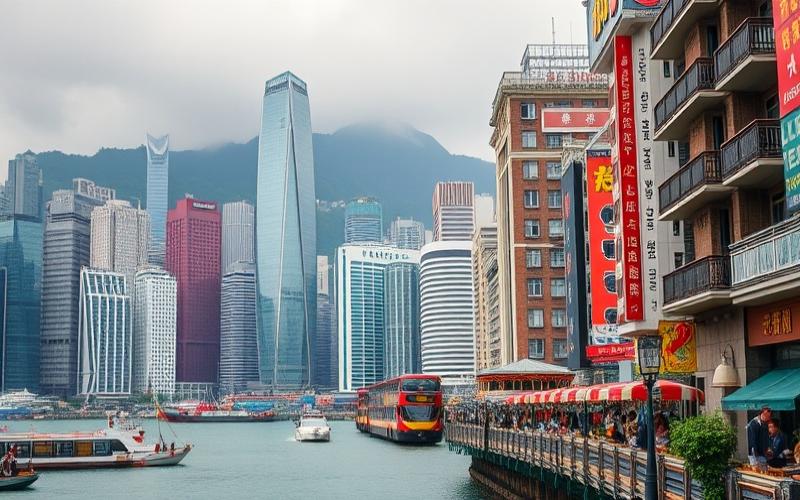
 Published on and written by Cyril Jarnias
Published on and written by Cyril Jarnias
Hong Kong, an international financial center and gateway to mainland China, offers a sophisticated and constantly evolving consumer market. With a population of over 7 million and one of Asia’s highest GDP per capita, this special administrative region of China presents unique opportunities for businesses seeking to establish or expand their presence in the region. Understanding the nuances of this market is essential for developing an effective business strategy and succeeding in this competitive environment.
The Hong Kong Consumer: Between Tradition and Modernity
Consumer habits in Hong Kong reflect a fascinating blend of traditional Chinese values and modern Western influences. Hong Kong consumers are known for being demanding, well-informed, and open to new trends. They place great importance on product and service quality while remaining price-sensitive.
Shopping culture is deeply ingrained in Hong Kong society. Luxury shopping malls coexist with traditional markets, offering a varied shopping experience. Hong Kong consumers are particularly fond of branded and luxury products, which are considered symbols of social status. However, they are also pragmatic and seek the best value for money.
The rapid adoption of digital technologies has significantly altered shopping habits. E-commerce and mobile shopping have experienced exponential growth, particularly since the COVID-19 pandemic. According to 2024 data, over 80% of Hong Kong consumers regularly shop online, with a marked preference for platforms offering a seamless omnichannel experience.
Good to know:
Hong Kong consumers value authenticity and quality but are also very receptive to technological innovations in retail. A strategy combining physical and digital presence is often the most effective way to capture this market.
A Segmented Market: Targeting for Success
The Hong Kong consumer market is highly segmented, reflecting its population diversity and significant income disparities. Understanding these segments is crucial for any business wishing to enter or expand in this market.
Connected Urban Youth
This segment, primarily composed of millennials and Generation Z, represents a growing share of the market. They are tech-savvy, environmentally conscious, and influenced by global trends. These consumers prefer brands that offer personalized experiences and align with their values. They are particularly receptive to influencer marketing and social media campaigns.
High-Income Professionals
This group, often composed of expatriates and local executives, has significant purchasing power. They seek premium products and services, with a preference for international luxury brands. Wellness, luxury travel, and fine dining experiences are particularly favored sectors among this segment.
Middle-Class Families
Representing a large portion of the population, this segment is crucial for many industries. These consumers are price-sensitive but aspire to a better quality of life. They place great importance on education, health, and family leisure. Products offering good value for money and well-established family brands are popular with this group.
Active Seniors
With an aging population, this segment is gaining importance. These consumers, often retired, have significant purchasing power and are particularly interested in health products, travel, and age-appropriate leisure activities. They are less influenced by fleeting trends and value brand stability and reliability.
Good to know:
Hong Kong market segmentation requires a nuanced approach. Marketing strategies must be adapted to each segment, considering not only demographic factors but also the specific values and aspirations of each group.
The Brand Battle: An Intensely Competitive Landscape
The Hong Kong consumer market is characterized by fierce competition, where local and international brands vie for consumer attention. This dynamic creates a stimulating but demanding environment for businesses.
Dominance of International Giants
Major international brands, particularly in luxury, fashion, and technology sectors, hold a predominant position in the Hong Kong market. Brands like Louis Vuitton, Apple, and Zara benefit from strong recognition and significant consumer loyalty. Their success relies on strong brand image, high perceived quality, and the ability to quickly adapt to local trends.
Emergence of Local Brands
Simultaneously, there’s a rise in local brands that capitalize on their deep market understanding and ability to quickly respond to specific Hong Kong consumer needs. Companies like Giordano in apparel or Vita in beverages have successfully carved out significant market share by offering products tailored to local tastes at competitive prices.
Growing Influence of E-commerce
Competition has intensified with the rise of e-commerce. Platforms like HKTVmall and Taobao Hong Kong have revolutionized the commercial landscape, offering consumers unprecedented access to a wide range of products. This evolution has forced traditional players to rethink their distribution strategies and heavily invest in their online presence.
The Battle for Customer Loyalty
In this highly competitive context, customer retention has become a major challenge. Brands are heavily investing in innovative loyalty programs, personalized marketing, and customer experience enhancement. Using customer data and artificial intelligence to offer tailored experiences has become a key differentiator.
Good to know:
To succeed in the Hong Kong market, brands must not only offer quality products but also create an emotional connection with consumers. Constant innovation, both in products and customer experience, is essential to stand out in this competitive environment.
Trends Shaping the Market
The Hong Kong consumer market is constantly evolving, influenced by global trends and local specificities. Understanding these trends is crucial for anticipating market changes and adapting strategies accordingly.
Rise of Social Commerce
Social commerce is experiencing explosive growth in Hong Kong. Platforms like Instagram, Facebook, and the popular Chinese app WeChat are no longer just social networks but are becoming genuine sales channels. Hong Kong consumers particularly appreciate the ability to shop directly through these platforms, influenced by peer and influencer recommendations. In 2024, it’s estimated that over 60% of online purchases in Hong Kong are influenced by social media content.
Growth of Ethical and Sustainable Consumption
Growing awareness of environmental and social issues is reflected in consumption habits. Hong Kong consumers, particularly younger generations, are increasingly attracted to eco-friendly and ethical brands. This trend manifests across various sectors, from fashion to food, and cosmetics. Companies that highlight their sustainability and social responsibility initiatives are gaining popularity.
Mass Personalization
Thanks to technological advances, particularly in artificial intelligence and data analytics, the personalization of products and services is reaching new heights. Hong Kong consumers now expect tailored experiences, whether in retail, financial services, or entertainment. Brands that successfully offer relevant and non-intrusive personalization gain a significant competitive advantage.
The Experience Economy
Beyond tangible products, Hong Kong consumers increasingly seek unique and memorable experiences. This trend manifests in retail with the emergence of experiential stores, but also in the leisure and tourism sectors. Pop-up stores, immersive events, and unexpected brand collaborations particularly attract consumers seeking novelty.
Health and Wellness at the Forefront
The COVID-19 pandemic accelerated an existing trend: the importance placed on health and wellness. Products and services related to health, fitness, and mental well-being are experiencing significant growth. This trend is reflected in food, with growing demand for functional foods and dietary supplements, but also in the fitness sector with the rise of personalized coaching apps and connected sports equipment.
Good to know:
Hong Kong market trends evolve rapidly. Businesses must remain agile and ready to adapt their offerings to meet changing consumer expectations. Innovation and authenticity are key factors for capitalizing on these trends.
Future Outlook: A Growing Market
Despite recent challenges, including those related to the pandemic and geopolitical tensions, Hong Kong’s consumer market shows promising growth prospects. Economic forecasts and demographic trends suggest a dynamic future for businesses that can seize opportunities.
Economic Recovery and Consumer Confidence
After a period of slowdown, Hong Kong’s economy shows encouraging signs of recovery. According to the latest IMF projections, GDP growth is expected to reach 2.7% in 2025, supported by recovering domestic demand and improving global economic environment. This recovery is accompanied by renewed consumer confidence, which should stimulate spending across various sectors.
Expansion of Luxury and Premium Products Market
Hong Kong remains a preferred destination for luxury brands, despite increasing competition from other Asian cities. The luxury market is expected to experience average annual growth of 4-5% over the next five years. This growth will be fueled not only by local clientele but also by the gradual return of tourists, particularly from mainland China.
Accelerated Digitalization of Retail
The digital transformation of the retail sector is accelerating. Analysts predict that e-commerce will account for over 40% of retail sales in Hong Kong by 2027. This evolution is accompanied by massive investments in cutting-edge technologies, such as augmented reality and artificial intelligence, to enhance both online and in-store shopping experiences.
Growth of Health and Wellness Sectors
Population aging and the focus on health following the pandemic are stimulating growth in health and wellness-related sectors. Annual growth of 7-8% is projected for these sectors in the coming years. This includes not only health and beauty products but also preventive health services and connected health technologies.
Development of Sustainable Products Market
Growing demand for environmentally friendly products opens new perspectives. The sustainable and eco-friendly products market is expected to experience annual growth of over 10% in the coming years. This trend offers significant opportunities for innovative businesses in sectors such as sustainable fashion, organic food, and renewable energy.
Good to know:
Although growth prospects are positive, the Hong Kong market remains sensitive to external influences. Businesses must remain vigilant about global geopolitical and economic developments that could impact the local market.
Conclusion: A Market of Opportunities for Visionary Businesses
The Hong Kong consumer market offers fertile ground for businesses capable of navigating its complexity and adapting to its rapid evolution. The unique combination of a sophisticated population, high purchasing power, and openness to innovation makes it an ideal test market for many international brands.
To succeed in this dynamic market, businesses must adopt a holistic approach, combining deep understanding of consumer segments, a robust omnichannel strategy, and the ability to constantly innovate. Attention to quality, customer experience, and sustainability will be crucial for winning and maintaining the loyalty of increasingly demanding Hong Kong consumers.
Ultimately, Hong Kong remains a strategic gateway to the vast Chinese market and an important hub for Southeast Asia. Businesses that successfully establish and thrive in this market will be well-positioned for broader regional expansion.
Disclaimer: The information provided on this website is for informational purposes only and does not constitute financial, legal, or professional advice. We encourage you to consult qualified experts before making any investment, real estate, or expatriation decisions. Although we strive to maintain up-to-date and accurate information, we do not guarantee the completeness, accuracy, or timeliness of the proposed content. As investment and expatriation involve risks, we disclaim any liability for potential losses or damages arising from the use of this site. Your use of this site confirms your acceptance of these terms and your understanding of the associated risks.


















